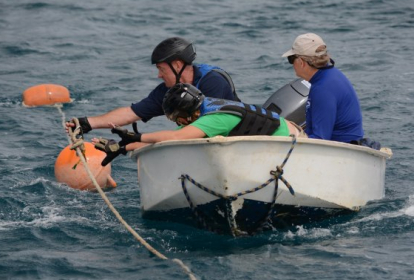As a global organisation, the IWC aims to be inclusive and accessible, and achieve the broadest possible participation. There are many different ways to engage, each with benefits for both participants and the Commission.
In recent years, the IWC has introduced a number of measures to increase accessibility and encourage engagement. These include mentoring for participants who are new to the IWC, virtual participation at events, including YouTube broadcast of biennial plenary meetings, and a voluntary fund to support participation by member governments of limited means,
Participants gain a voice at the global, intergovernmental forum for cetacean conservation and management. Other benefits include practical training opportunities, support from expert panels in a range of subjects, and access to the latest research at meetings of the world’s leading cetacean scientists. Below is a list of the opportunities to become more involved in the work of the IWC. If you would like more information please contact secretariat@iwc.int.
Sharing Information
The IWC gathers data on a range of different topics. Member governments are invited to submit National Progress Reports, Voluntary Conservation Reports and catch information, including bycatch data on accidental catches in fishing gear.
Governments and many other sources also contribute data on cetacean strandings, entanglement, collisions between whales and vessels, known as ship strikes, and direct catches for food, bait, trade or traditional use. The more information can be gathered and analysed, the greater the understanding of these issues. Once researchers understand why and where the biggest problems exist, all those involved at every level – from local to regional and international - can work together to solve them.
Join a Group
There are a wide range of IWC groups. Some are long-term initiatives and others are convened to address a particular issue during one intersessional period. Each group is instigated by one of the six main committees of the IWC. Some focus on governance and administration issues such as operational effectiveness and strengthening finance. Others address conservation or welfare concerns, from bycatch and entanglement to ship strikes and whale watching. A third group focus on particular species through targeted initiatives such as Conservation Management Plans and Task Teams. The Scientific Committee of the IWC also convenes many specialist groups, each comprised of cetacean scientists representing governments, academic institutions and non-governmental organisations around the world.
Groups often work intersessionally and by correspondence, so joining a group can be a very manageable commitment and an excellent way to engage on specific issues of interest to a government or organisation.
- Click here for a list all the groups convened by the IWC for the intersessional period 2018 – 2021.
Take a role
IWC member governments and, in some cases, accredited observers or invited participants are also encouraged to take specific roles, leading groups as chairs, vice chairs and convenors, or supporting them as rapporteurs or mentors. There are many different ways to take a role and a range of opportunities are available.
- Please click here for a list of all the current groups, or find out about any current vacancies by contacting the IWC Secretariat at secretariat@iwc.int
Attend a meeting
Participating at an IWC meeting is an excellent way to engage with other members of the IWC community, exchange information, identify common interests, or highlight and make progress on priority issues. The scale of meetings varies from the week-long biennial Commission meeting of 400+ delegates, to small training workshops with 20 participants and a specific, regional focus. Some funding is available to enable member governments of limited means to attend meetings of the Commission and its sub-groups, and the details are available here.
In 2020, the IWC was one of many organisations to rapidly extend its use of virtual meetings in response to the Covid-19 pandemic. The IWC is exploring the scope to make greater use of virtual meetings in future and particularly in order to enable participation by those who might not otherwise be able to attend.
Host a meeting
The scale of IWC events varies greatly. Biennial meetings of the full Commission are both a significant commitment and an excellent opportunity to showcase a country, attract 400+ visitors from all over the world, and raise awareness of the host government’s work on cetaceans and environmental/sustainability issues more generally.
Meetings of the Scientific Committee are on a smaller scale. Usually attendance stands at around 150 people, again from all around the world. These events last for up to two weeks and are accessible to scientists from the host country who might not otherwise have the opportunity to take part.
Workshops are held regularly and on a diverse range of subjects. The format varies depending on the topic. Some involve practical work, for example boat-based sessions teaching safe responses to whale entanglement, and lab-based demonstrations of necropsy techniques. Other workshops take a classroom or discussion approach and participation ranges from 10 to 100 people.
Funding is available to cover the cost of hosting an IWC meeting, and the IWC Secretariat provides extensive support, as well as handling many of the arrangements.
- For more information about hosting IWC Commission meetings click here.
- For more information about hosting Scientific Committee meetings click here.
- For information about hosting a workshop, or any other enquiry please contact secretariat@iwc.int.
Observer Organisations
Accredited observers play an important role at the IWC. As well as attending Commission meetings, submitting opening statements and making interventions on the plenary floor, observers sit on Expert Panels, support a wide variety of work programmes and are active members of the Commission's sub-groups, including the Scientific and Conservation Committees.
More information about the accreditation process for observer organisations is provided here.


